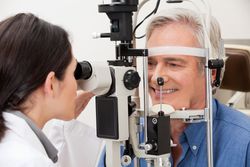How Diabetes Affects Your Eyes

Diabetes has many aspects that patients must manage, including eye care. Diabetic eye disease is comprised of a few conditions, including diabetic retinopathy, macular edema, glaucoma, and cataracts. Since November is National Diabetes Month, now is a good time to understand more about diabetic eye care and related diseases.
Types of Diabetic Eye Disease
Diabetic Retinopathy
Chronic high blood sugar affects the blood vessels in the retina, causing them to swell, become distorted, and eventually blocked. The condition progresses through four stages that may result in the detachment of the retina. Retinopathy can lead to blindness, so it is imperative to catch it in early stages. Since the disease is asymptomatic early on, have a regular eye exam once a year that includes dilation so your eye doctor can get a good look at the back of your eye.
Diabetic Macular Edema (DME)
 Macular edema is characterized by the build-up of fluids in the part of the retina called the macula. DME is a sub-condition of diabetic retinopathy; roughly half of those with retinopathy develop DME. Vision loss results as the functionality of the macula — responsible for vision necessary for reading, recognizing faces, and driving — is lost. Both retinopathy and DME can be detected via a comprehensive eye exam.
Macular edema is characterized by the build-up of fluids in the part of the retina called the macula. DME is a sub-condition of diabetic retinopathy; roughly half of those with retinopathy develop DME. Vision loss results as the functionality of the macula — responsible for vision necessary for reading, recognizing faces, and driving — is lost. Both retinopathy and DME can be detected via a comprehensive eye exam.
Glaucoma
Glaucoma can be present with or without diabetes, but diabetes doubles the risk of the development of the disease. Glaucoma consists of multiple conditions that damage the optic nerve. Glaucoma erodes the vision, beginning with peripheral sight and then closing in on straight-ahead vision until blindness results. Caught early through regular eye exams, it is treatable and preventable.
Cataracts
Cataracts affect millions of Americans, and adults with diabetes are two to five times more likely to develop this clouding of the eye’s lens. Most cataracts are age related, but those with diabetes are prone to this condition at an earlier age. Cataracts are caused by proteins coagulating together on the lens of the eye. As the group of proteins grows, it gradually covers the entire eye. Surgery is the main treatment for cataracts, but not all cataracts will need to be removed. Your eye care professional will be able to advise on the best course of action if you develop cataracts.
If you have special vision needs due to diabetes, Midwest Eye Center: A Division of TriState Centers for Sight serves the greater Cincinnati area and northern Kentucky with full-service eye care. Their doctors are board certified and treat diabetic retinopathy, glaucoma, macular degeneration, cataracts, and more. They also offer regular eye exams, optometry services, and have various locations to serve you conveniently. Call (859) 525-6215 to make an appointment, or visit them online to learn more about their services, doctors, and locations.
About the Business
Have a question? Ask the experts!
Send your question

